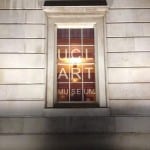INSTG012 Historical Bibliography Print Techniques Workshop at the UCL Art Museum by Nikki Gregory
By Anne Welsh, on 28 November 2014
 Following Simone’s post about our class visit to St Bride’s Printing Library, I thought I would share our experience learning about different print techniques using materials from the UCL Art Museum.
Following Simone’s post about our class visit to St Bride’s Printing Library, I thought I would share our experience learning about different print techniques using materials from the UCL Art Museum.
The practical session on the methods of printing led by Curatorial Assistant and print artist J. Yuen Ling Chiu (@yuenlingchiu) was an hour’s worth of hands on experience with printed pictures. Have you ever looked at a print and wondered how it was made? Well wonder no further with this module session.
We started by each choosing a printers tool which was used to make one or more of the printed images displayed around the room. After a few minutes of studying the images, we were asked to guess which tools were used to make each of the prints. Firstly we looked at some woodcut prints, made with a ‘u’ tool, which is used by scraping lines in the wood. This imprints very defined straight lines which are tapered at the ends where the tool enters and leaves the wood. The ink is then rolled onto the remaining sections of wood to create the print. This is known as relief printing. We also looked at copper engraving and etching (in which acid is used to cut into the metal).
One of the forms of etching I found most interesting was the aquatint, where a cloud of blue dust is thrown into the air and left to settle onto a piece of copper sheet. Wax is then placed on certain sections, before the sheet is dipped into acid which burns through the dust to leave white flecks on the print. The print is then built up with layers of wax and acid to for the picture.
Another interesting technique is mezatint, where the surface starts very black, and layers of white are created on top using a tool which had grooves running along the edge, ending in little teeth. These teeth were used to ‘smoosh’ (technical word!) the dots together by rocking the tool from side to side.
After this quick induction we were set loose on a new set of prints, discussing which method of printing was used to create each print. On the whole I like to think we got more than half of them right between us.
If this doesn’t convince you that Historical Bibliography is a good optional module to choose, then the seminars on collation and quasi-facsimiles will top the balance! I am looking forward to the remaining seminars that this module has to offer.
Editorial Note: UCL Art Museum is closed for refurbishment until April 2015, but its programme of teaching and public engagement is continuing off-site. We are very grateful to J. Yuen Ling Chiu and Dr Andrea Fredericksen (UCL Art Museum Curator) for delivering this regular session for INSTG012 in the Haldane Room this year. You can find details of the Museum’s ongoing programme of events on its website. Staff also contribute to @UCLMuseums on twitter, UCL Museums and Collections facebook page, and the Museums & Collections playlist on UCLTV on YouTube. — Anne Welsh, INSTG012 Historical Bibliography Module Coordinator.
—–
Nikki Gregory (@NikkiG434) is a full-time student on the MA Library and Information Studies.
Image: Anne Welsh.
Note: the appearance of the byline on this post is auto-generated, indicating that it was posted by Anne Welsh. Apart from the editorial note, Nikki Gregory is the sole author of this piece.
 Close
Close



 Yesterday part-time MA LIS student Siobhan Britton gave an introduction to zine-making at a
Yesterday part-time MA LIS student Siobhan Britton gave an introduction to zine-making at a 

